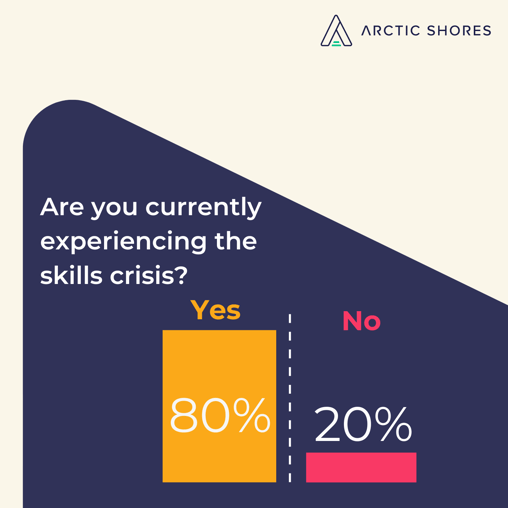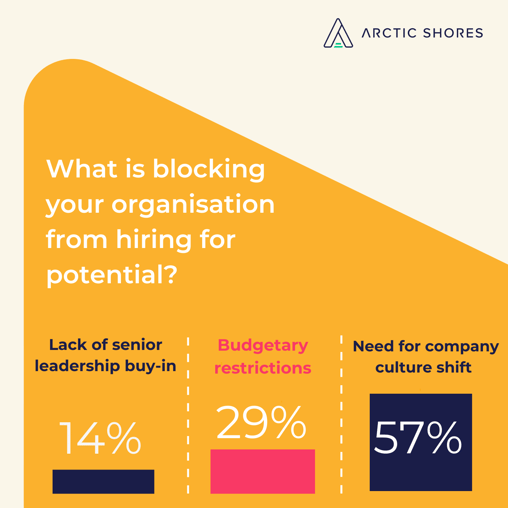With the economic downturn already showing its effect on growth margins for organisations, people are considered to be the most valuable contributors of success to the growth of every business.
However, in a market with fierce competition and a skills shortage that is not going anywhere anytime soon, how do you identify the right people for your organisation, while achieving hiring success?
Our recent webinar with HR Grapevine explored what it means to hire for potential and why this is the only solution out of the skills crisis.
Here are some of the questions answered by our panel experts, which included Kerry Sneddon - WSP, Tony De Graaf - SmartRecuriters, and Robert Newry, our CEO and Co-Founder.
What is potential-based hiring and what does it mean to you?
Robert Newry: “We’ve got more jobs that require certain skills than we have people who have those particular skills to take up those roles. So, we either play a form of musical chairs to keep recruiting from the same small talent pool or look at potential-based hiring to fill these roles and break the cycle. Potential fall into two categories, human skills and workplace intelligence (your learning agility, information processing, etc), once you put these things together you have an overview of potential-based hiring”.
Kerry Sneddon: “For us, it’s about placing an emphasis on hiring candidates on personal attributes rather than great professional results. We need to recruit candidates from these skilled backgrounds, but we also require people to have transferable skills and the motivation to learn. The industry is going through a significant change, and we need to adapt going forward”.
Tony De Graaf: “There are also a few key elements that go behind potential-based hiring, one is the motivations and lifestyles, with the next being skills and capabilities. You can’t just hire for skills, as the motivations may be mismatched to the expectation of the organisation, this is why it’s important to think about how it fits the current needs”.
Why do you think hiring for potential can help the talent shortage?
Robert Newry: “We’ve just gone through a fundamental shift, and in the past as employers, we could always find candidates with experience and the right skills. It just isn’t the case now. We need to think differently about how we fill these roles, and by removing the comfort blanket of the CV, we can start looking at people’s potential”.

How do you assess someone's motivation as a candidate? When cliched questions such as 'Why do you want to join us?' no longer work.
Tony De Graaf: “Best practice is a combination of assessment and questions. Work with scorecards for structured interviews, and dig deeper, ‘what do you want to achieve? Where do you want your career to be in a year?’ - and ask these same questions to every candidate. Why? Because if you don’t you can’t compare the exact motivations for each candidate against each other’.
How do you shortlist applicants for interviews without a CV? What is the end-to-end process with the hiring manager?
Kerry Sneddon: “All of our candidates go through a very short application, while we do need to recruit from a STEM background, we don’t use CVs and haven’t for a very long time now, because we wanted to remove unconscious bias. We send candidates through to the behavioural assessment, this is where we pull out the passion and then we shortlist to an assessment centre where there’s a group activity. It’s at this point they also do a technical assessment, but with as much information as possible, and they have information to help them prepare. After we discuss and decide who we’ll be taking through, quite often we end up with more great candidates than we need!”

What is your take on the link between 'hiring for attitude' and diversifying the Talent pool in a company? Do you think that 'recruiting for attitude' is potentially exacerbating the issue of recruiting mini-mes of the hiring managers that are involved in the process?
Sarah Williams: “The issue with this is that if you look for specific things like a top tier university it brings up systemic issues of bias, as typically these institutions have only hired, for example, white privileged men, and if the person interviewing get on with the candidate even personality can cause a bias”.
Tony De Graaf: “I see this happen a lot. We need to understand why people make the ultimate hiring decision, as hiring for attitude can lead to unconscious bias - it’s how our brains work. This means we need to consciously define what attitude means so that our hiring managers/interview managers know how to try to mitigate it”.
Robert Newry: “The difference between where we were for hiring for attitude, and now introducing the idea of potential, is that attitude has a focus on similarity, whereas potential is all about behaviours. This means that along with a structured interview, it’s about having extra data points that you can use in the interview, for example, this is where a psychometrics test can fit in perfectly. This also allows support for people who are neurodiverse and may find interviews difficult or people who are introverted and may not thrive in an interview environment. So, really we need to be asking, ‘how do I bring out you in the interview to be your best self’, rather than the current Spanish Inquisition style of ‘how do we trip you up’, which just doesn’t work”.
You can watch the full webinar here.